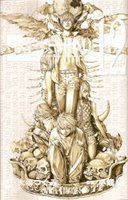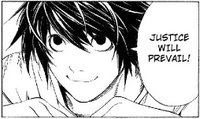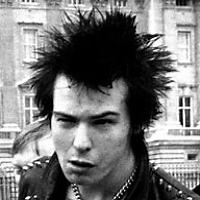
I've recently caught the Death Note life-action movie and I was impressed enough with the storyline to check out the 12-volume manga that the movie was based on.
Tsugumi Ohba wrote the original story and Takeshi Obata provided the comic art. It was a splendid collaboration as Obata's graceful artwork gave visual depth to Ohba's highly suspenseful plot. I haven't been reading manga since Slam Dunk ended its run, but enjoyed Death Note immensely. Perhaps it is time to pick up more manga, just to find out what other great stories I've missed out. The manga source material was far richer than the movie, and I am looking forward to Death Note 2, coming out later this year.
In a nutshell: the story is set in present day Japan. A bored Shinigami (or Death God) drops his Death Note in our world. (I'm curious about how the action is initiated by boredom. To paraphrase the saying, all the evil in the world, all because we could not sit still in a room.)
The Death Note is a magical item possessed by the Death Gods. When a person's real name is written in the Death Note, that person will die of heart failure in 40 seconds. There are many more rules and clauses to the use of the Death Note, some of which drive the twists and turns in the plotline.
Needless to say, Yamagami Light, a bored (boredom again) Japanese high school student with a genius IQ, gains possession of the Death Note and proceeds to use it to eliminate criminals around the world. Yamagami Light is the dangerous embodiment of how power corrupts, and absolute power corrupts absolutely. A sociopathic mass murder that justified his actions with abstract, lofty ideals, he is later hailed as a god known as KIRA. He is feared by the world, yet also worshipped as the harbringer of a New World Order.
In Death Note, the characters are made to question if the present political system of the world should really be allowed to continue, and the ultimate question: is KIRA a criminal or truly a god that promises to remake the world as a New Eden? I've often observed a prevailing sense of social existentialism or discontent in many of the Japanese manga I've read. Often, the story features an Ubermensch anti-hero that advocates a "cleansing" process to bring forth a New World Order. What is it about Japan?
Against KIRA (aka Yamagami Light) is the anonymous world-famous master detective known only as L, who has made it his mission to apprehend KIRA. (It is also part of the tradtion of Japanese manga where far-fetched superhuman abilities are attributed to characters. We are meant to suspend disbelief. Really. You will enjoy the story better when you do.)
L is one of the most delightful manga characters I've encountered. An eccentric but brilliant sleuth, he possesses a genius capacity for observation and deduction. He is the spiritual antithesis of KIRA/Yamagami Light. Where Yamagami Light is handsome, suave and respectable in all outward aspects - L hunches when he walks, dislikes wearing shoes and exudes an almost primitive physicality. Yet L represents our best hope, and he is portrayed with a boyish, endearing sweetness that is convincing. L represents humanity in its innocence. He believes justice will prevail, he believes in us. And we want him to win.
The whole thrill of Death Note is the mind-game between L and KIRA/Yamagami Light as they plot and strategize, anticipating each other's move. We are caught up watching two geniuses so similar in the way they think, yet so different in the way they have evolved. Tsugumi Ohba is a masterful writer - he somehow always manages to pull the carpet out from under you. Most of all, he is the kind of writer that believes characters are subordinate to the story and he is willing to kill off important characters to drive the story forward. (Without giving away too much of a major plot-twist away, a few Death Note fans have stopped reading after Volume 7 because they were too upset.) For a long time, it really seems that KIRA/Yamagami is destined to win.
So for the past few weeks I've been hooked on the battle of wits between between KIRA/Yamagami Light against those who goes against him. It is one of those classic battle of Good versus Evil, yet with enough ambiguities thrown in so that nothing is ever simplistic.
My real complaint is that towards the end, the energy of the pursuit loses steam. The conclusion was a little unsatisfying. It felt a little forced. But I also understand it would be extremely difficult to manage a more satisfying denouement; the writer did what he could.
At the end, order is restored and justice is poetic - but wait - nothing is as simple as it seems. On the very last page, Death Note leaves us a message of how KIRA is merely a manifestation of a very important aspect of our humanity. KIRA never dies, can never die, because deep down inside, we pray for a god-like figure to deliver us from the world we created for ourselves.







